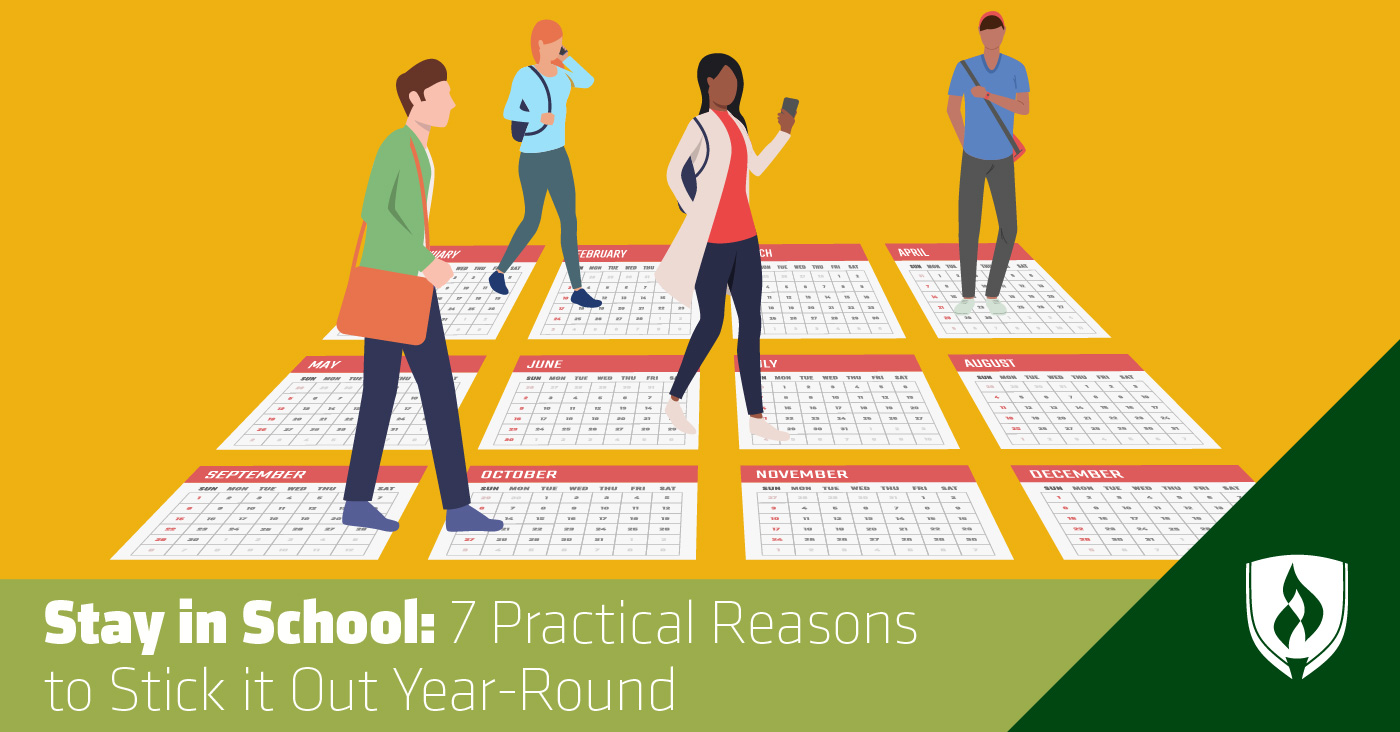
Your decision to earn your degree is likely driven by its ability to propel you toward a successful career. And while you’re ready to invest the time and effort needed to take your coursework seriously, you’re itching to get this process moving so you can branch out on your own and get a taste of success.
Believe it or not, the traditional autumn-to-spring school year was originally established with those who worked in agriculture in mind—summers were reserved for working on the land, as it was an economic necessity at the time. This model is still upheld today, but it bears fewer of the intended benefits for modern-day students.
One of the ways you can earn your degree and transition into a career as smoothly (and quickly) as possible is to stay in school year-round. The benefits of this educational model are vast and they all center around making your college experience more focused and efficient.
7 reasons to stay in school year-round
1. You can finish your degree faster
Adopting the model of year-round coursework will undoubtedly decrease the total time spent earning your degree. While earning a bachelor’s degree traditionally takes at least four years, utilizing the idle time during summer and winter vacations can cut an entire year from that equation, resulting in a bachelor’s in just three years.
It might seem like a drag to cut the ever-beloved summer vacation from your life for a few years, but this is the most efficient way to get on the fast track to the career you’ve always wanted.
2. You’ll save money
Many college students forego the option of remaining in school year-round simply so that summers can be spent working like crazy to save up for that next batch of tuition fees. But both college expenses and foregone wages actually end up being higher for students who take five or six years to complete their bachelor’s degree, rather than three or four.
This year-round model can also alleviate some of the expenses for the institution itself. Expanding the academic year creates a new capacity to enroll more students. And often times, the cost to maintain idle school buildings in the off-season is reflected in higher tuition for students.
3. You won’t forget what you learned
Remaining enrolled in classes year-round means you’ll never miss a beat when it comes to transitioning from one course to the next. Extended breaks between classes can often mean that valuable course time will be spent reviewing the basics of what you learned before the interruption.
Spreading your coursework out across the span of the entire also allows you to focus more intensely on your field of study. A reported 53 percent of college freshmen must take at least one remedial course to prepare for the rigor of college requirements. A year-round course load would be less stressful and ease you in more cautiously, as you would likely be taking fewer courses at one time.
4. You can retain your coveted spot in your program
A huge part of the college experience is learning alongside other students. This is especially true for programs like nursing that boast limited spots for enrollment and are often dependent on regular cohort groups. A small break can sometimes cause you to lose your spot and wait even longer to re-enter.
Regardless of your program, there is a definite benefit to journeying through your education with other students who have progressed at the same rate as you have. Taking time off can sometimes disrupt that balance and force you to establish new classmate relationships each semester.
5. You’ll experience a more laid-back campus atmosphere
Many students have already discovered the benefits of attending college year-round, but it still is not considered the norm. That’s why attending school during the traditional summer and winter vacations provides a much calmer environment.
The crowded busyness of the traditional fall and spring semesters can be enough to get to anyone—parking spots are hard to come by, hallways are filled with people and the library is packed with students at every table. You may also benefit from smaller class sizes and more one-on-one help from your professors.
6. You will be more likely to finish your degree
It can be difficult to find the motivation to start up another semester after indulging in the freedom of summer break. You might hit a strong stride at your summer job and be met with the temptation of putting school off an extra year to continue dedicating yourself to work.
While there’s nothing particularly wrong with either of these scenarios, if your end goal is to complete your degree as efficiently as possible, continuous enrollment in your program can help eliminate any possible temptation to postpone it.
7. You can get a taste of the professional lifestyle
If your chosen institution offers off-season enrollment, taking advantage of that opportunity can not only save you time and money, but it can also prepare you for life after college. Entering the workforce will come with a host of new practices to grow accustomed to—new policies, extensive training, long hours and so much more.
Even if you’re fortunate enough to land a gig at which you can accrue vacation days, there are no summer or winter breaks in the corporate world. Attending college year-round can help prepare you for the sense of work ethic and non-stop dedication that you will likely need in your career.
Stay on the fast-track
A goal-oriented person like you is used to getting where you need to go as quickly as possible—earning your degree should be no different! With the support of these seven practical reasons, the decision to stay in school year-round may now be easier than you thought.
The first step to making it happen is deciding which direction you want to point your career goals toward. Use Rasmussen College’s Career Roadmap to help decide which vocational goals are perfect for you.




